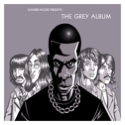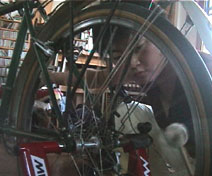 DJ Danger Mouse’s The Grey Album has been on my iPod for a week now, and I’m still feeling conflicted by it. In case you’ve missed the story, executive summary: DJ Danger Mouse has taken Jay-Z’s “The Black Album” and remixed it with samples from the Beatles “White Album.” The results are brilliant, frustrating, obnoxious, beautiful, and an insult to the legacy of the Beatles (though ironically, probably intended as a tribute). If you haven’t heard it, download mirrors are all over the place. And EMI is dispensing cease-and-desist letters like Pez.
DJ Danger Mouse’s The Grey Album has been on my iPod for a week now, and I’m still feeling conflicted by it. In case you’ve missed the story, executive summary: DJ Danger Mouse has taken Jay-Z’s “The Black Album” and remixed it with samples from the Beatles “White Album.” The results are brilliant, frustrating, obnoxious, beautiful, and an insult to the legacy of the Beatles (though ironically, probably intended as a tribute). If you haven’t heard it, download mirrors are all over the place. And EMI is dispensing cease-and-desist letters like Pez.
Looking at The Grey Album from three angles:
1) As a concept and a piece of technical wizardry
2) As a challenge to copyright law
3) As a piece of artwork
1) Technically, the Grey Album is a remixological wonder. Danger Mouse is a whiz. It’s a trip to hear such familiar strains hashed and rehashed and whipped up and layered back down with this kind of slick wrist expertise. It’s like there was an explosion at the LP factory and somehow all these disparate parts came back down to earth magically hanging together — all wrong, but still somehow totally in sync. While there are long-ish excerpts from The White Album, most of the Beatles you get here are new beats created by twisting and tangling and untangling snippets from familiar songs. Listening to this stuff, half my attention is busy marvelling at Danger Mouse’s skills.
2) It’s funny how this case overlaps with the Ken Light Kerry/Fonda case that’s been front and center for me at work lately – both involve two works by different creators being remixed by a 3rd party. In Light’s case, lawyers are trying to determine whether newspapers can run the composite/collaged image copyright-free or whether royalties are due. Striking parallels to the Danger Mouse project.
Last Tuesday, thousands of web sites mirrored copies of The Gray Album in an all-day protest called Grey Tuesday, the idea being that if enough people participated in the protest, they’d all get away with it. The Electronic Frontier Foundation has posted comments on the legal position of Grey Tuesday participants.
Napsterization wonders what your rights are “if you own the two albums outright already, and simply want the blended version, remixed?” Great question.
At Corante, Ernie Miller wonders whether some kind of remix formula or recipe could be created to allow consumers to recreate the Dangermouse mix from the two original sources, thus sidestepping copyright issues. I respond that the suggestion is similar to the technique used to distribute the lame MP3 encoder, thus bypassing Fraunhofer’s patent. But music is not a computer program, and I am highly doubtful that sufficient notation could be devised, or that anyone could enter in the data in sufficient detail to recreate the artwork.
3) No matter how marvelous the mix or how interesting the copyright questions, you’re still left with a work of art that somehow has to stand on its own, despite leaning so completely on the work of others. Bottom line: Is it a good record? Well, I’ve been listening to it for days, so it must not be a total abomination. But for the most part, I keep listening because I’m fascinated, not because I think it’s a particularly good record. I’m not much of a rap fan to begin with, and Jay-Z’s style doesn’t do much of anything to goose my predilections. As rappers go, his delivery is bland and his lyrics mediocre. It’s not all gangsta, but there’s way too much of this kind of crap (from various tracks):
All my wimmin get tennis bracelets…
Used to deal snowflake by the O.Z….
I like big-body Benzes…
Stay away from ho’s…
I got 99 problems but the bitch ain’t one…
So you get this amazing mix experiment, all these great old Beatles riffs chopped up tossed up chunked up in cruel and unusual (and very cool) ways, all colliding bizarrely with this semi-gangsta crap. The result is as depressing as it is amazing.
Yes, many of the lyrics are better than the ones I quoted, but bottom line is that Jay-Z’s rap is not worthy of The Beatles backing music (even remixed). In fact, it creates the opposite effect: You get the feeling that one of the greatest records of all time by one of the greatest groups of all time has just had mud ladled all over it. You hear these old Beatles samples, and those lyrics start running through your head. Then Jay-Z starts up with his juvenile patter and you just feel kind of robbed. Listening, I go back and forth between digging this whole crazy messed-up adventure on one hand, and feeling like a great chapter in human creativity has been totally desecrated on the other.
My favorite lyric on the album:
“And if you can’t respect that
your whole perspective is whack,
maybe you’ll love me
when I fade to black.”
Well, maybe. I like what Danger Mouse is trying to do from an experimental POV, I like the way he’s challenging copyright, I dig the beats, I enjoy hearing the Beatles in a totally new vein, but the rap pretty much cancels out any positive net effect. Not entirely, but pretty much. All told, I guess I just feel kind of grey about it.

 After a long downtime,
After a long downtime,  On the second night of the recent
On the second night of the recent 